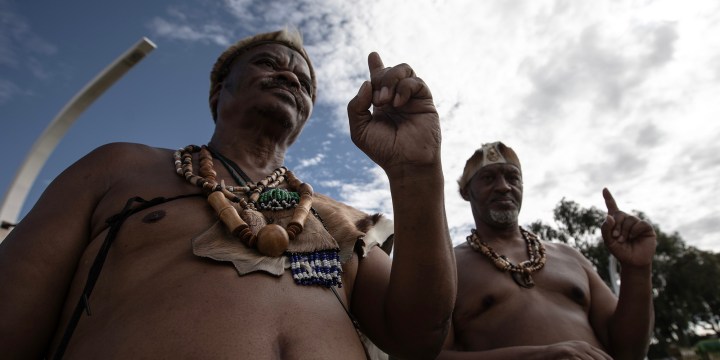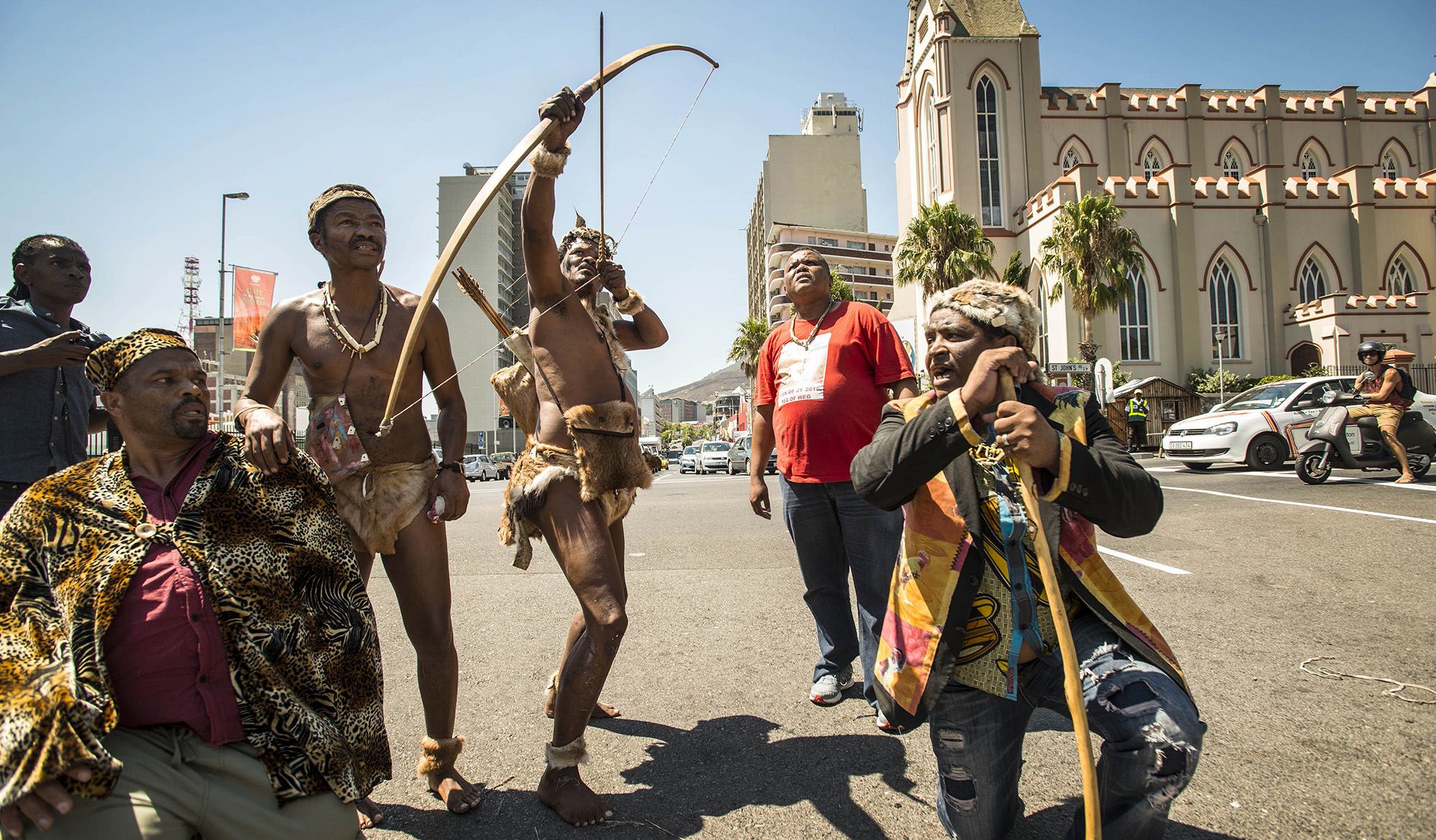TRADITIONAL IDENTITIES OP-ED
The government should not blame the Mogale judgment for Khoi-San Commission struggles

Pitting groups who are trying to assert their constitutional rights and traditional identities against one another not only threatens social cohesion, but also resembles divide-and-rule tactics used by the colonial and apartheid governments.
In March the Commission on Khoi-San Matters* held a research symposium to fulfil its mandate in terms of the 2019 Traditional and Khoi-San Leadership Act (TKLA). The commission was established to investigate applications for the recognition of Khoi and San communities and leadership structures for the first time in South Africa. It is receiving applications until 29 May 2025 and is required to make recommendations to the government on each application.
That date marks the end of the two-year suspension put in place for the Constitutional Court’s order in the Mogale v Speaker of the National Assembly case. In May 2023, the court declared that the TKLA was unconstitutional since Parliament did not facilitate adequate public participation while making the law, but this invalidity will only take effect after two years. This was to give Parliament time to process the law again if it so chooses, in a manner that complies with the Constitution’s requirements. In the meantime, the Commission on Khoi-San Matters has continued to operate and accept applications in terms of the Act.
The commission’s work is critical and complex. Commissioners are constrained by the TKLA’s strict criteria for recognition in section 5, as well as a dearth of evidence to back claims due to the brutal historical destruction of Khoi and San identity. This was the reason for the symposium – could existing academic research illuminate histories and understandings to facilitate the commission’s analysis of applications received?
However, there is a larger question that was not immediately addressed at the symposium. What happens to the commission’s work once the Constitutional Court’s order takes effect? The commission derives its status and mandate from the TKLA – if it ceases to be valid, so too does the commission. Aside from some initial discussion in Parliament, the government’s plan for responding to the Mogale judgment has not been apparent. National elections also loom, so any unfinished work in Parliament (such as a new Bill) would require revival by the next elected legislature.
After some prompting, the Department of Traditional Affairs revealed that a new Traditional and Khoi-San Leadership Bill is imminent, and it will include transitional mechanisms to preserve the commission’s work. However, Parliament is likely to need an extension from the Constitutional Court to complete its legislative process.
Director-General Mashwahle Diphofa explained at the symposium:
“We are trying to work towards continuity because if this Act falls away and Parliament has not done anything … [t]hen it means that the earlier Act, the [Traditional Leadership and Governance Framework Act 41 of 2003], which was repealed by the TKLA, comes back into operation. The problem with the Framework Act is that it says nothing about the Khoi and San. So that’s why we are trying to avoid that situation, that we don’t want that gap where there is nothing in place for the Khoi and San communities.”
It is clear from this plan that the government’s intentions of recognising Khoi and San structures remain intact and that there is a legally viable method of continuing to do so despite the Mogale judgment. Yet, Deputy Minister of Cooperative Governance and Traditional Affairs, Prince Zolile Burns-Ncamashe, suggested at the symposium that the court’s ruling jeopardised Khoi and San community recognition. He also implied that this ultimately was the strategy of the applicants who brought the case.
He stated that:
“This Act which is a historical milestone … has been invalidated by the Constitutional Court, not out of our own making but out of the NGOs that are hellbent on retrogressing every effort to redress the atrocities of the past. The reality here is that we emerge from the history … of genocide, massacre, ethnic cleansing. Almost to the complete obliteration of a nation and its people. … That is why, consciously, South Africa has taken a decision to take Israel head-on. … It was a necessary thing to do because we have gone through that experience. We have seen it in Namibia where our own brothers and sisters were decimated by the Germans.”

Members of the Khoi San Revolution protest outside Parliament in Cape Town on 8 February 2016. (Photo: Gallo Images / The Times / David Harrison)
This description of the Mogale case is misleading and cynically capitalises on two publicly emotive issues: the conflict in Palestine and the continuing failure to make adequate reparations for Khoi and San peoples’ lost land, language and cultural heritage.
Contrary to the deputy minister’s statement, applicants in the Mogale case were clear about their support for the “overdue” recognition of Khoi and San structures but maintained their right to challenge unlawful legislative processes and raise concerns about the TKLA’s remaining provisions. This is because the Khoi and San recognition provisions are nested within a larger framework of traditional governance that impacts millions of people. According to the applicants, the rest of the TKLA threatened democracy in former Bantustan areas. At public hearings prior to the TKLA’s enactment, this prompted some calls for Khoi and San recognition to be addressed in a dedicated statute rather than tying it to the problems of the TKLA. This advice was not heeded by Parliament.
Pitting groups who are trying to assert their constitutional rights and traditional identities against each other not only threatens social cohesion, but also resembles divide-and-rule tactics used by the colonial and apartheid governments. It obscures that the government ultimately holds the power to recognise Khoi and San structures and facilitate a fuller enjoyment of their cultural and linguistic identity. After all, the commission’s recommendations need to be ratified by the Minister of Cooperative Governance and Traditional Affairs.
Where does this leave people who want official recognition as Khoi-San communities? The commission’s task was difficult from the start, as many people pointed out during legislative hearings that they would struggle to provide evidence to meet the recognition criteria. This was inherent in the TKLA’s design.
So, it is disingenuous for the government to blame others for the tough position that the commission is in. Rather, it should direct its attention to supporting the commission to approach its investigations with an understanding of the context in which Khoi and San communities find themselves. Robustness must be accompanied by an openness to innovative methods of evidencing community claims. Likewise, communities are requesting assistance with completing the detailed application forms. The government’s responsibility to address these issues has nothing to do with the outcome of the Mogale case. DM
*Use of the term “Khoi-San” in legislation is widely disputed. It is used in this article only when referring to official structures or titles in terms of the legislation under discussion.
Monica de Souza Louw is the deputy director and a researcher at the Land and Accountability Research Centre in the Faculty of Law at the University of Cape Town. Thanks to Kyle Janse for assistance with this article.




















Comments - Please login in order to comment.